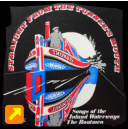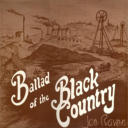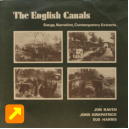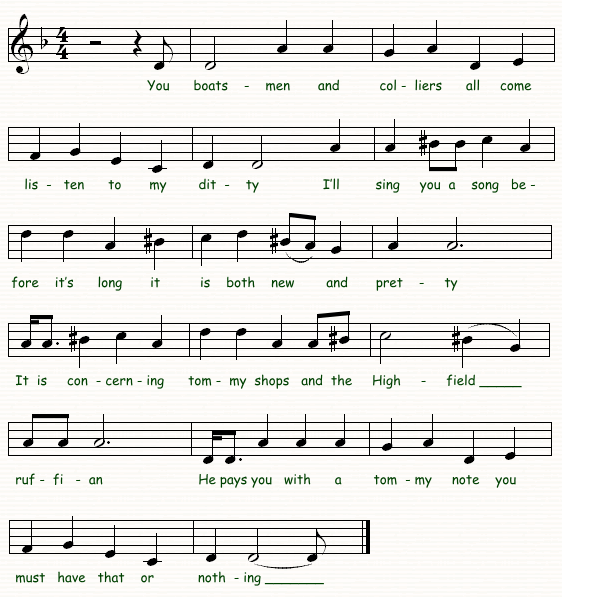The Tommy Note
As recorded by The Boatmen
You boatsmen and colliers all, Come listen to my ditty,
I'll sing you a song before its long, It is both new and pretty;
It is concerning Tommy shops, And the High field* ruffian
He pays you with a tommy note, You must have that or nothing.
Fal de riddle ral.
With the colliers I begin, How they pay each other,
Nothing have they but a tommy note, From one week to the other,
On Saturday when a week's work is done, And to receive their money,
The high field devil has learned a trick, To pay them off with tommy.
Fal de riddle ral.
The boatsmen now I bring in, That sails from high fields to Runcan*;
The boatsmen and their wives, They curse him at the junction.
And all belonging to the branch, That know the art of boating,
Wishing the tiller down his throat, It would be a means to choak him.
Fal de riddle ral.
When they have done their runcan voyage, And go to receive their money,
One half stops for hay and corn, The other half for tommy,
Then to the tommy shops we go, To fetch our week's provision,
Their oatmeal, sugar, salt and soap, Short weight and little measure.
Fal de riddle ral.
Saying if we had money instead of this, Provision we could have plenty,
The profit they get out of us, Is nine shillings out of twenty,
Then we jump on board the boat, And the children look so funny,
The voyage we so cheerful go, Till we have eat all our tommy.
Fal de riddle ral.
There is one amongst the rest, That knows the art of boating,
He vows and swears a wife he'll have, So long he has gone a courting,
He vows he will married be, Come listen to my joke sir,
And when the parson's done his work, I will pay him with a tommy note, sir.
Fal de riddle ral.
Now we have finished our voyage, The children look so funny,
For here at Runcan we do lie, And have eat all our tommy,
Come gear the horse and clear the line, And jump on board the boat, sir,
Both night and day we'll stear our way, For another tommy note, sir
Fal de riddle ral.
The text comes from 'Ballads and Broadsides' by Theo Vasmer, a
broadside now catalogued in Birmingham Reference Library. The original
broadside indicated a chorus line of 'Fal De Riddle Ral'.
The melody was structured from traditional elements by Jon Raven. Both
can be found in 'Victoria's Inferno'.
The recording by 'The Boatmen' is a slight variation on this printed
version. David Blagrove in the sleeve notes from this recording say : This
'real old un' as boatmen say comes from the early 19th century. I would
guess before the opening of the Birmingham and Liverpool Junction
(now the Shropshire Union) in 1835. Tommy Shops were a well known
evil before the Truck Acts ended them. 'Highfields' is most probably the
headquarters of the carrying firm. The words were sent to me by Mr
Prior of Oxford.
The Tommy Note appeared on the 1975 recording Ballad of
the Black Country by Jon Raven. The sleeve notes written by Jon Raven are
reproduced below:
The story of England’s canals is told on Tradition Records LP ‘The Bold Navigators’, TSR 019, where this important song also
appears. The canal people seem to have been one of the few groups to avoid the song collectors of the late 19th and early 20
century and, perhaps as a consequence, we have few songs from the canal people. The Tommy Note is currently the only full
industrial song we have from them but its unique nature is two fold since it is also the only industrial song to deal in its entirety
with the Truck system and this is quite remarkable since the number of songs from colliers, weavers, metal workers, etc, is very
considerable. Not only this but the Truck system permeated the way of life of vast numbers of industrial workers and was
detested by most and abused by the majority of employers. In brief the system of ‘Tommy’, as it is known, meant payment by
company note exchangeable only at the company shop or a shop designated by the company. After the Truck Acts many
companies got round the restrictions by holding a shop in the name of a family member or some trusted person. Thus the
company had, or could have, absolute control over the economic lives of its workers and this often meant low quality goods at
high quality prices and sometimes, as is the case in the Potteries, it meant an employee being given totally useless items that
the shop wished to dispose of.
Broadly speaking, the language and style of the songs of different industrial groups gives some insight into attitudes towards
their employers. For example colliers songs tend to be hard hitting and uncompromising, nailmakers’ songs respectful and
beseeching. The Tommy Note illustrates, perhaps, an aspect of the character of the canal folk in so far as the song is sometimes
bitter with touches of humour but generally gives out the impression that canal folk as a group just let things take their course
and, while they did not like Tommy, would rather go with the tide than make a positive effort to combat the system.
Words, Broadside, Birmingham Library. Tune, Jon Raven, structured from traditional elements.
When recorded by Mike Raven and Joan Mills with Saga the tune used was 'Shady Groves' (Matty Groves) adapted by
Michael Raven. A chorus was added.
To my ral, to my ral, to my ri-dee-o
To my ral, to my ri-dee-ay
To my ral, to my ral, to my ri-dee-o
Hey-ho my tommy-o
Recorded on :







As recorded by Mike Raven and Joan Mills
As recorded by Jon Raven



The Tommy Note
As recorded by The Boatmen
You boatsmen and colliers all, Come listen to my ditty,
I'll sing you a song before its long, It is both new and pretty;
It is concerning Tommy shops, And the High field* ruffian
He pays you with a tommy note, You must have that or nothing.
Fal de riddle ral.
With the colliers I begin, How they pay each other,
Nothing have they but a tommy note, From one week to the other,
On Saturday when a week's work is done, And to receive their money,
The high field devil has learned a trick, To pay them off with tommy.
Fal de riddle ral.
The boatsmen now I bring in, That sails from high fields to Runcan*;
The boatsmen and their wives, They curse him at the junction.
And all belonging to the branch, That know the art of boating,
Wishing the tiller down his throat, It would be a means to choak him.
Fal de riddle ral.
When they have done their runcan voyage, And go to receive their
money,
One half stops for hay and corn, The other half for tommy,
Then to the tommy shops we go, To fetch our week's provision,
Their oatmeal, sugar, salt and soap, Short weight and little measure.
Fal de riddle ral.
Saying if we had money instead of this, Provision we could have
plenty,
The profit they get out of us, Is nine shillings out of twenty,
Then we jump on board the boat, And the children look so funny,
The voyage we so cheerful go, Till we have eat all our tommy.
Fal de riddle ral.
There is one amongst the rest, That knows the art of boating,
He vows and swears a wife he'll have, So long he has gone a courting,
He vows he will married be, Come listen to my joke sir,
And when the parson's done his work, I will pay him with a tommy
note, sir.
Fal de riddle ral.
Now we have finished our voyage, The children look so funny,
For here at Runcan we do lie, And have eat all our tommy,
Come gear the horse and clear the line, And jump on board the boat,
sir,
Both night and day we'll stear our way, For another tommy note, sir
Fal de riddle ral.
The text comes from 'Ballads and Broadsides' by Theo Vasmer, a
broadside now catalogued in Birmingham Reference Library. The
original broadside indicated a chorus line of 'Fal De Riddle Ral'.
The melody was structured from traditional elements by Jon Raven.
Both can be found in 'Victoria's Inferno'.
The recording by 'The Boatmen' is a slight variation on this printed
version. David Blagrove in the sleeve notes from this recording say :
This 'real old un' as boatmen say comes from the early 19th century.
I would guess before the opening of the Birmingham and Liverpool
Junction (now the Shropshire Union) in 1835. Tommy Shops were a
well known evil before the Truck Acts ended them. 'Highfields' is
most probably the headquarters of the carrying firm. The words
were sent to me by Mr Prior of Oxford.
The Tommy Note appeared on the 1975 recording Ballad of the Black
Country by Jon Raven. The sleeve notes written by Jon Raven are
reproduced below:
The story of England’s canals is told on Tradition Records LP ‘The Bold
Navigators’, TSR 019, where this important song also appears. The canal
people seem to have been one of the few groups to avoid the song
collectors of the late 19th and early 20 century and, perhaps as a
consequence, we have few songs from the canal people. The Tommy Note
is currently the only full industrial song we have from them but its unique
nature is two fold since it is also the only industrial song to deal in its
entirety with the Truck system and this is quite remarkable since the
number of songs from colliers, weavers, metal workers, etc, is very
considerable. Not only this but the Truck system permeated the way of
life of vast numbers of industrial workers and was detested by most and
abused by the majority of employers. In brief the system of ‘Tommy’, as it
is known, meant payment by company note exchangeable only at the
company shop or a shop designated by the company. After the Truck Acts
many companies got round the restrictions by holding a shop in the name
of a family member or some trusted person. Thus the company had, or
could have, absolute control over the economic lives of its workers and
this often meant low quality goods at high quality prices and sometimes,
as is the case in the Potteries, it meant an employee being given totally
useless items that the shop wished to dispose of.
Broadly speaking, the language and style of the songs of different
industrial groups gives some insight into attitudes towards their
employers. For example colliers songs tend to be hard hitting and
uncompromising, nailmakers’ songs respectful and beseeching. The Tommy
Note illustrates, perhaps, an aspect of the character of the canal folk in
so far as the song is sometimes bitter with touches of humour but
generally gives out the impression that canal folk as a group just let
things take their course and, while they did not like Tommy, would rather
go with the tide than make a positive effort to combat the system.
Words, Broadside, Birmingham Library. Tune, Jon Raven, structured from
traditional elements.
When recorded by Mike Raven and Joan Mills with Saga the tune
used was 'Shady Groves' (Matty Groves) adapted by Michael Raven. A
chorus was added.
To my ral, to my ral, to my ri-dee-o
To my ral, to my ri-dee-ay
To my ral, to my ral, to my ri-dee-o
Hey-ho my tommy-o
Recorded on :







As recorded by Mike Raven and Joan Mills
As recorded by Jon Raven






















